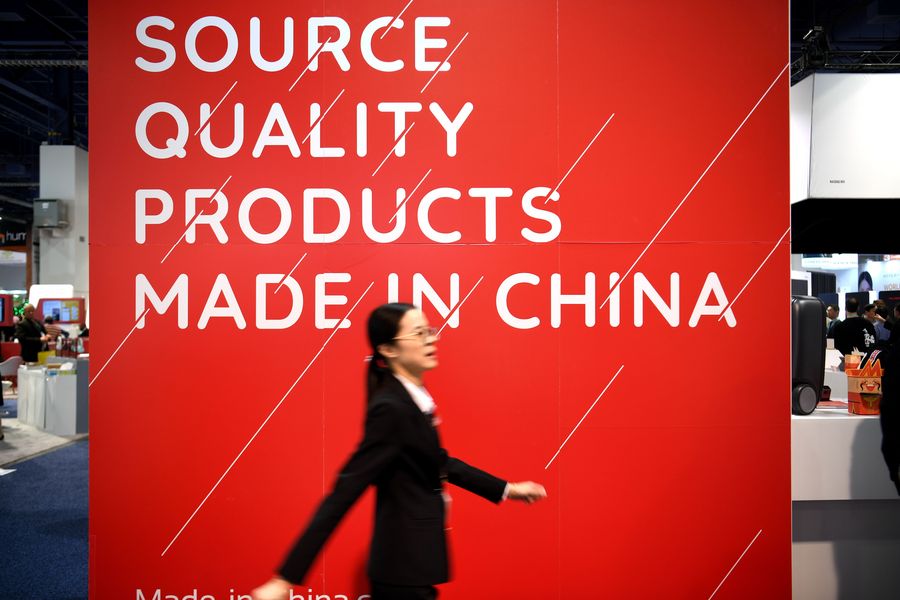
A woman walks past a poster at the 2020 Consumer Electronics Show (CES) in Las Vegas, the United States, Jan. 7, 2020. (Xinhua/Wu Xiaoling)
"China is innovating across many fields now. Transport innovation, AV (autonomous vehicle), and electric mobility innovation in all forms are happening more so in China than in the United States at the moment," said Melissa Ruhl, senior transportation planner for London-based engineering consultancy Arup.
By Julia Pierrepont III, Huang Heng
LAS VEGAS, United States, Jan. 10 (Xinhua) -- Exhibitors and attendees expressed their great interest in trading with China during the Consumer Electronics Show (CES) 2020, held here from Tuesday to Friday.
In the packed Las Vegas Convention Center, around 1,000 Chinese companies have attended the event this year, said the Consumer Technology Association.
The California-based Ultra EVSE, a company that offers simple and affordable electric vehicle supply equipment, has manufactured products for years in Shenzhen, a city in south China's Guangdong province known as the "Silicon Valley of China."
Michael Lee, director of sales and marketing for Ultra EVSE, told Xinhua that "our electrical components have to be done right and cost-effectively, and our Chinese partners are invaluable to us."
Impossible Foods, a company that offers plant-based substitutes for meat products, sees China as "an important market," said Sheetal Shah, the company's senior vice president of product and operations.
The company was founded by Stanford biochemistry professor Patrick Brown in 2011 when he decided to make a substitute for meat which could deliver the same taste.
When asked about the company's China strategy, Celeste Holz-Schietinger, director of research for Impossible Foods, said that "if we want to get rid of animal agriculture, we need to be global, and China is front and center for that goal."
Referring to e-commerce, Daniel Weisblum, senior intelligence manager for Coresight Research, a New York-based retail research firm, said the "influence and sophistication of online shopping and other digital e-commerce technology has shifted from the West to the East, with China, Korea and Japan taking the lead."
Meanwhile, China's AI industry has also attracted the attention of participants.
"Chinese consumers are fully adapted to online shopping and China's AI-driven personalization is far ahead of what we see in the West," Weisblum added.
Melissa Ruhl, senior transportation planner for London-based engineering consultancy Arup, told Xinhua that "China is innovating across many fields now. Transport innovation, AV (autonomous vehicle), and electric mobility innovation in all forms are happening more so in China than in the United States at the moment."
"Electric buses, for instance, and apps like Didi for ridesharing are huge and growing. Didi was one of first to tackle ridesharing and micro-mobility issues," she added.

People visit Chinese drone maker DJI's booth at the 2020 Consumer Electronics Show (CES) in Las Vegas, the United States, Jan. 8, 2020. (Xinhua/Wu Xiaoling)
David Scott Neal, director of design at Launch Forth R&D, said that each country has its own preferences and issues most relevant to its market, and China is no exception.
"China is coming up with interesting ways to solve traffic density issues to limit the number of cars on the road. And they are also more interested in AV cars that can create a better limousine experience for their passengers. Bigger, more comfortable, safer," he said.
Pennsylvania State Representative Ryan MacKenzie attended CES for the first time, saying "it is great to see this kind of innovation."
Mackenzie told Xinhua that "We are all optimistic about the future of trade with China." ■



